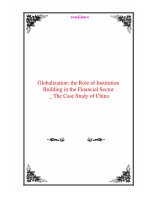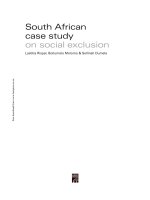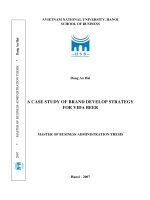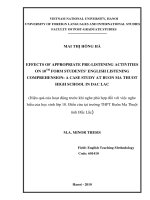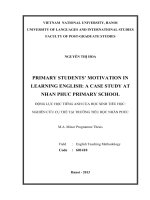Case study 7 HRM PEOPLE STRATEGY AT BARSETSHIRE COUNTY COUNCIL
Bạn đang xem bản rút gọn của tài liệu. Xem và tải ngay bản đầy đủ của tài liệu tại đây (63.29 KB, 3 trang )
Case Study 7. HRM PEOPLE STRATEGY AT BARSETSHIRE
COUNTY COUNCIL
The case
You are the Director of HR at Barsetshire County Council and after extensive discussions
with your Chief Executive, members of the Council’s Cabinet, other interested parties and
your HR colleagues, you drafted a statement for the Chief Executive to issue about the
proposed People Strategy. As amended slightly by the Chief Executive, this is set out below.
The People Strategy statement
We see the People Strategy as central to the delivery of effective and improving
services. We also accept the need for fundamental changes to the way we work and
how we work together and with others.
We need to change the organization’s culture, the way we do things round here.
This will require not only changing the way we work but also our behaviours and
attitudes. We believe we must become an organization that attracts, supports, enables
and retains people who are talented, risk taking, innovative and creative. To do this we
must break away from our fairly traditional people management practices of the past
and become a sharper, more flexible and resilient organization.
We know the broad challenges for us over the next five years are going to be:
●
Increasing demands on services through growing customer expectations.
●
Changing roles of the County Council arising from the Local Government White
Paper and subsequent Local Government Act.
●
Working more effectively with other public services.
●
Delivering services through a range of public and private sector organizations.
●
Resources will get tighter and we will have to do more with less.
● Our discussions have established that our organizational culture reflects the
following principal features:[…]
●
While we have made some progress on working together across directorates and
professional areas, we still work predominantly within professional constraints and to
defined job descriptions. We often fall back on professional job demarcation and still
rely on detailed job descriptions.
●
We have competent operational middle managers but many have yet to acquire
leadership skills.
●
Our people still rely on their managers for training and development opportunities
rather than seek them for themselves.
●
We have a modern salary progression scheme which allows employees to be
rewarded for exceptional performance and which is a step in the right direction, but
pay remains our main method of motivating people.
●
We remain cautious about tackling under-performance.
●
Communication between the Council and its staff is still very traditional with
messages and information coming from the top down.
●
We believe that these current ways of working do not encourage the behaviours and
approaches we need to change the way we work and often form barriers to
innovation, creativity and flexibility.
The task
The statement by the Chief Executive has been discussed thoroughly and she has now
asked you as Director of HR to draft a position paper which briefly describes the approach
you recommend to developing a People Strategy as a basis for further discussion. Prepare
this paper.
Comments
The statement by the Chief Executive clearly indicates the main issues that need to be
addressed. There is plenty of choice about what needs to be done and the priorities that
should be attached to any proposed actions. These may include organizational development
(culture change), and resourcing, learning and development, performance management and
reward policies. A business case will have to be prepared showing the potential added value
arising from any specific proposals.
The following is a summary of a People Strategy document based upon one actually
prepared by the County Council in this case.
Essential elements of the proposed People Strategy
We know that we need to change the culture of the Council to meet the challenges
ahead. In consultation with staff and managers, we concluded that our future
organizational culture must:
● Make it easier to work with teams and staff who work in other directorates, professional
areas and in partner organizations. Working in specialist professional or directorate
silos will be a thing of the past. We want to develop flexible and fluid organization
structures and more flexible individual roles, making us more responsive to
customers and increasing job satisfaction for our staff.
●
Incorporate strong leadership skills.
●
Be built on a wider definition of personal development which will mean that our
people will actively take responsibility for their own learning and development.
●
Ensure people feel recognized and rewarded for a good job done.
●
Reward the behaviours we want to encourage.
●
Not tolerate under-performance.
●
Have internal communication arrangements which allow information and views to flow
both from managers to their staff but also upwards to managers and policy makers.
In planning terms we need a detailed action plan covering the initial three-year period
with a review at the end of that period. Our priorities for year one should be to:
●
make sure our recruitment arrangements allow us to bring quality new managers and
leaders into the Council and that our development programmes improve the quality of
existing managers so they are competent to make these changes happen;
●
start to modernize our main employment policies around performance, capability,
discipline and absence;
●
bring together existing and develop new approaches to rewards and recognition of
performance;
●
examine and pilot innovative ways we can encourage and help our staff to work more
creatively;
●
increase the number of people we employ with disabilities;
●
start the process of developing a new sort of HR service which will work much more
in partnership with managers to ensure that they have the skills and information to
manage their staff effectively.

